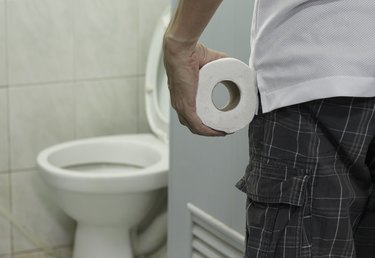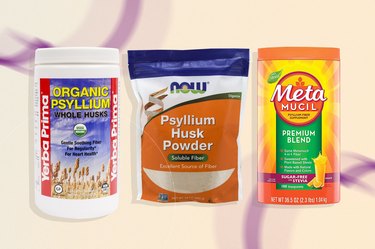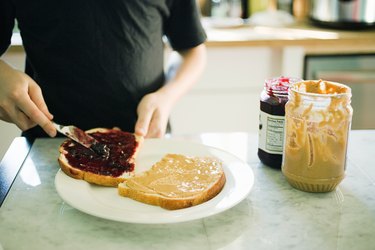
It's that rumbling in your stomach, that need-to-find-a-bathroom-now feeling, that inevitable part of life that doesn't make for polite conversation, but still needs to be discussed: diarrhea.
For most of us, diarrhea is only an occasional inconvenience. Still, when it happens, you want a solution ASAP. Here are some natural remedies for diarrhea that offer relief fast.
Video of the Day
Video of the Day
1. Foods to Eat
There aren't really foods that stop diarrhea, says Randy Meisner, MD, a gastroenterologist with Spectrum Health in Grand Rapids, Michigan, but certain foods can help clear it up.
Soluble Fiber
While the BRAT diet (bread, rice, applesauce and toast) used to be the gold standard for diarrhea, it's no longer recommended because it's too restrictive and research shows it doesn't help with diarrhea.
Instead, reach for foods with soluble fiber, which move more slowly through the digestive system, according to OncoLink. These are known as binding foods for diarrhea, because they help make stools more solid.
Per the Mayo Clinic, foods high in soluble fiber include:
- Oats
- Peas
- Beans
- Apples
- Citrus fruits
- Carrots
- Barley
Is Lemon Good for Diarrhea?
Lemons are high in soluble fiber, but they're not very pleasant to eat. Instead, try citrus fruits like oranges or grapefruit (and keep in mind that fruit juices do not contain fiber).
Plain Foods
Eating bland and easy-to-digest foods is a good way to stop diarrhea fast at home, especially when the condition is severe, according to OncoLink.
Skip heavy seasonings and sauces and opt for foods like the following:
- Lean proteins like chicken, fish and eggs
- Mashed potatoes
- Noodles
- Rice
- Smooth peanut butter
- Well-cooked vegetables
Tip
Eating five to six smaller meals throughout the day may be easier on your digestive system than eating three larger meals, per OncoLink.
Probiotic Foods
Although Dr. Meisner notes there isn't conclusive data on the effectiveness of probiotics for diarrhea, he says some patients benefit from probiotics — microorganisms that live in the GI tract and also occur in some foods — in cases of diarrhea caused by an acute infection.
An August 2017 American Family Physician study found probiotics are highly effective for diarrhea caused by infection, antibiotic-associated diarrhea and even diarrhea from some gastrointestinal disorders, including irritable bowel syndrome.
Probiotics are highly individual, however, so you may have to do some trial-and-error to find what works for you, Dr. Meisner says.
Probiotic-rich foods include:
- Yogurt and kefir
- Sauerkraut
- Kimchi
- Miso
- Tempeh
What About Apple Cider Vinegar for Diarrhea?
It's not clear whether apple cider vinegar can be counted among the home remedies for diarrhea. Some research, including a February 2016 paper in Pharmacy Today, notes ACV might delay the emptying of the stomach, which sounds promising. But ACV is also very acidic, which could irritate the gut and lead to digestive problems for some people.
2. Drinks to Try
Hydrating won't get rid of diarrhea, but it's essential to help you avoid dehydration, which is a potentially serious consequence of diarrhea, even if the condition only lasts a few days, Dr. Meisner says.
The symptoms of dehydration can include dizziness, feeling lightheaded or weak, concentrated urine and decreased urination, confusion and thirst, according to the Mayo Clinic.
Water
The best drink for diarrhea is water, and you may need to drink extra to stay hydrated if you are experiencing diarrhea, Dr. Meisner says.
Electrolyte Drinks
An electrolyte solution — such as Gatorade ($15.89 for 12, Amazon) or Pedialyte ($23.16 for 4, Amazon) — may also be helpful, but be careful: If they're high in sugar, it could make your diarrhea worse.
Is Ginger Good for Diarrhea?
Ginger root can help alleviate nausea and vomiting, according to the Cleveland Clinic, which are symptoms that often accompany diarrhea. But research is mixed on whether ginger can help get rid of diarrhea. Keep in mind that many ginger ale drinks may be made with artificial flavorings rather than natural ginger, so it's not the best herbal remedy for loose stools.
3. Foods to Avoid
Some foods can cause diarrhea or make it worse, Dr. Meisner says.
Artificial Sweeteners
Artificial sweeteners are high on that list. Sugar substitutes — such as aspartame or Splenda — are often culprits behind diarrhea, Dr. Meisner says, because they can pull water into your gut.
These types of sweeteners are often found in the following foods, according to the Mayo Clinic:
- Soft drinks, such as diet soda
- Powdered drink mixes
- Sugar-free gums and candies
- Baked goods
- Canned foods
- Dairy products
- Jams and jellies
- Puddings
Dairy
Lactose, the sugar found in milk and other dairy products, can cause diarrhea for some people, Dr. Meisner says.
Having diarrhea after eating or drinking dairy products is a common sign of lactose intolerance, according to the Cleveland Clinic. It's estimated that 65 percent of adults worldwide have lactose intolerance, so it's definitely something to consider if you notice your diarrhea is occurring after eating or drinking foods like:
- Cow's milk
- Yogurt
- Butter
- Cheese
- Ice cream or frozen yogurt
- Sour cream
Fatty or Fried Foods
Dr. Meisner says eliminating some fatty foods may also help stop liquid diarrhea.
High-fat foods like fried chicken or potato chips can be tough for some people to digest, according to Harvard Health Publishing. When these foods aren't broken down well, they go to the colon, where the fat is turned into fatty acids, causing the colon to secrete fluid — and voila, diarrhea.
According to the USDA, unhealthy high-fat foods to avoid include:
- Fast foods (such as those from Burger King, McDonald's and Taco Bell)
- Fried foods like fried chicken
- Whipped cream
- Fatty meats, such as beef short ribs
- Fatty snack foods, such as potato and corn chips
- Processed meats, such as pepperoni, bacon and sausage
- Desserts, such as dulce de leche and chocolate cake
- Some salad dressings
Spicy Foods
Foods made with hot peppers (think: hot sauce) contain a compound called capsaicin, which is responsible for that burning sensation in your mouth, according to a June 2016 paper in Molecules.
Capsaicin can irritate your GI tract, causing digestion to speed up, which is why spicy food results in diarrhea for some people.
Tip
A specific food intolerance could be causing your diarrhea. Other symptoms of food intolerance include stomach pain or cramping, gas and bloating, per the Cleveland Clinic. Keeping a food journal can help you identify possible trigger foods and limit or avoid them going forward.
4. Drinks to Avoid
Steering clear of certain sips is another way of managing diarrhea naturally.
Caffeine
Caffeine speeds up digestion, according to Harvard Health Publishing. When waste gets pushed through too quickly, your digestive system doesn't have a chance to absorb enough of the liquid, causing loose stools.
To treat watery diarrhea, cut back on foods and drinks that contain caffeine, including:
- Coffee
- Tea
- Soda
- Energy drinks
- Chocolate
Alcohol
Drinking too much alcohol may cause diarrhea the next day, especially when it comes to beer and wine, according to the International Foundation for Gastrointestinal Disorders.
"Too much" is a relative term determined by your body, but keep in mind the Centers for Disease Control and Prevention recommend sticking to one drink per day for those assigned female at birth and up to two drinks for those assigned male at birth.
Plus, alcohol is dehydrating, so even if it's not the cause of your diarrhea, you'll want to avoid it so you don't make the dehydrating effects of diarrhea worse.
Make Sure It's Actually Diarrhea
If you’re having chronic or reoccurring diarrhea, it’s important to assess whether it could be fecal incontinence instead, Dr. Meisner says.
Diarrhea is defined as an increased amount of stool, but fecal incontinence is when you don’t have the ability to control your bowel movements, according to the Mayo Clinic. This often results in accidents or soiling of undergarments and is not necessarily increased quantity of stool.
The difference is important, Dr. Meisner says, because a doctor will need to assess the two conditions differently, so don’t be afraid to speak with your doctor if you are actually experiencing incidents of incontinence and not just diarrhea.
5. Supplements
Fiber
Fiber supplements add bulk to stool and makes for a relatively safe holistic diarrhea solution, according to Stanford Medicine. Stick to a dose of about 3 to 5 grams so you don't overdo it and end up with constipation.
Digestive Enzymes
If you are lactose intolerance, taking lactase enzyme supplements before you eat dairy can help prevent sypmtoms, including diarrhea, according to Mount Sinai.
What About Probiotics?
There's only mixed and limited evidence that taking a probiotic supplement can help with diarrhea, per Mount Sinai. Generally, you only need probiotics if you're taking antibiotics or you have a J-pouch.
When to See a Doctor
If your diarrhea has gone on for more than a month, it's time to schedule a checkup.
"Chronic, reoccurring diarrhea can be indicative of a more severe illness," Dr. Meisner says.
The Mayo Clinic also notes you should see a doctor for diarrhea accompanied by symptoms such as fever, severe pain or stools that appear bloody or black.
- UPMC: "Diarrhea Causes, Treatment, and Symptoms"
- Mayo Clinic: "Diarrhea: When to See a Doctor"
- American Family Physician: "Probiotics for Gastrointestinal Conditions: A Summary of the Evidence"
- Mayo Clinic: "Artificial sweeteners and other sugar substitutes"
- MyFoodData: "Top 10 High Fat Foods to Avoid"
- Harvard Health Publishing: "Is something in your diet causing diarrhea?"
- Cleveland Clinic: "Food Problems: Is it an Allergy or Intolerance"
- Molecules: "Capsaicin, Nociception and Pain"
- International Foundation for Gastrointestinal Disorders: "Common Causes of Chronic Diarrhea"
- Centers for Disease Control and Prevention: "Alcohol Use and Your Health"
- OncoLink: "Low Fiber Diet for Diarrhea"
- Mayo Clinic: "Dietary fiber: Essential for a healthy diet"
- Mayo Clinic: "Fecal incontinence"
- Pharmacy Today: "Apple cider vinegar for diabetes: Limited evidence, potential risks"
- Cleveland Clinic: "Ginger Ale and Saltine Crackers? 5 Ways to Ease Stomach Pain and Nausea"
- Cleveland Clinic: "Lactose Intolerance"
- Mount Sinai: "Diarrhea"
- Stanford Medicine: "Chronic Diarrhea Treatments"
Is this an emergency? If you are experiencing serious medical symptoms, please see the National Library of Medicine’s list of signs you need emergency medical attention or call 911.


